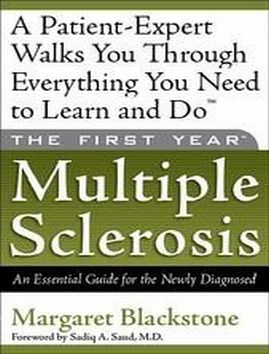
I have in my possession a great book for newbie MSers. I found it a few years ago at a book store, and I still refer to it. It’s The First Year – Multiple Sclerosis, by Margaret Blackstone. The author is a seasoned writer who has published other medical works as well as poetry and children’s books. And Ms. Blackstone has been living with MS.
The book is part of a series of health guides for first year patients. They all follow a basic structure, which starts off with the first day of having a diagnosis. The guides give advice for days 1-7, then weekly information for the first month, then tips for each month thereafter until the one-year mark of having been diagnosed.
In The First Year – Multiple Sclerosis, Blackstone gives great advice for the first turbulent week after an MS diagnosis. She allows readers to rant, feel pain and confusion, and at the same time she gives practical information about MS basics, tests, ways to build a healthcare team, holistic care, advice about who to tell, and ways to cope.
During the first month, Blackstone explains MS myths and stereotypes, ways to make daily life a little easier, wellness strategies, information on relapses, and facts about the disease-modifying medications.
The First Year – Multiple Sclerosis goes on to describe ways to manage symptoms, cope with stress, eat healthy for more energy, employ alternative medicines, handle health insurance, maintain intimacy and start a family, and learn about trends in multiple sclerosis research. The information is presented in a one-year format, so it doesn’t become overwhelming and it gives those new to MS a way to chart their courses and have some control over an unpredictable situation.
What I love the most about this book is that although it is written for the first year after diagnosis, Blackstone touches on so many topics that are important in any stage of the condition. For more information about The First Year – Multiple Sclerosis, click here…

